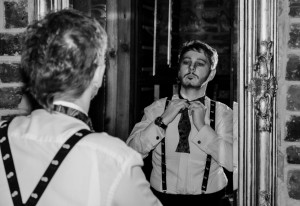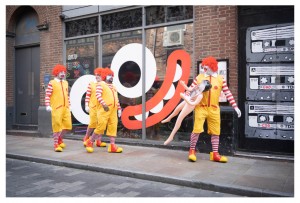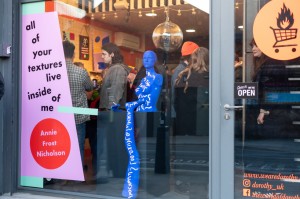Goodbye Syndrome? The Happy Jug Interview
As they prepare their last experimental arts show of 2015 — a play entitled The Happy Jug — Syndrome talk to C. James Fagan about Proust, the human condition, and replacing actors with concrete sculptures…
Ha ha ha, he he he, Little Brown Jug, how I love thee.
An odd quote to start an interview with, but the latest offering from experimental arts, music and technology performance lab Syndrome – a ‘play’ entitled The Happy Jug — owes its creation to the destruction of a jug. A domestic object: though an object is never just an object, is it? Even the simplest of things can grow complex with the passage of time and the layering of sentiment. Often, you might not realise the power until it is unleashed by the moment of its destruction.
It is this point of destruction – the smashing of said jug — that is the starting point for The Happy Jug’s premiere this Thursday; the final event of Syndrome’s 16-month exploration into the intersection between language, technology, interaction and the human condition. Sometimes nightmarish, always intriguing, Syndrome was instigated in April 2014 by curator and writer Nathan Jones of Mercy – who describes his work as crossing “experimental poetics, textual-noise, glitch and schizo-poetics” – and has been a collision and collusion between poets, artists, musicians, filmmakers… and kickboxers.
Apt, then, that a final instalment of twisted multi-discilpinary arts will be in the same vein; The Happy Jug isn’t ever going to be a traditional play. A fusion of script, electronic musical composition, concrete and plaster sculpture and motion-sensitive video from Liverpool’s best and brightest – Nathan Jones, Simon Jones, Chris Boyd, Jon Davies (Kepla), and Madeline Hall – we decided to approach them all with some questions, and here are their (group) responses…
The Double Negative: There seems to be a contradiction with the description of The Happy Jug as a ‘post Human drama’. Yet it is based around an object (the titular Happy Jug a treasured family ornament), something that seems very un-post human. To quote Dr Who: It’s isn’t, isn’t?
Syndrome: To quote Tim Morton, whose work inspired some of the thinking behind this play: “There is no metalanguage”. That is, we’re always _inside_ the condition of being human, and so of course any name we give to a play, or anything else for that matter is un-post-human.
Post-human doesn’t simply mean not human anyhow, but it refers to an aesthetic situation which goes beyond the ‘humanist’ to become ‘thingist’. It is a crisis of the human in this sense, something which belittles and anthropocentric ways of thinking by contextualising them among the multitude of other interactions happening all the time.
The challenge with the play is to work beyond the schism of language and the post-human to try and expose the drama that exists between objects, things, as they relate to and withdraw from each other in the world.
In the play, for example, a brain is a thing, it is part of a human of course, but that’s just an aspect of it — things that unfold throughout the play show how things reveal their complexity, going well beyond our relation to them, especially when they cease to work as we expect.
The Happy Jug is also performed by sculptures, so it’s post-human in the sense that there are no actors to share the journey with.
Is this some kind of hardcore Proustian thing? Multiple mediums generating/stimulating multiple memories…
The play is not nostalgic in the least. But the echo that is thrown through Proust’s Remembrance of Things Past by the Madeline biscuit [Proust wrote about how his childhood memories where trigged by the smell of freshly cooked Madeline biscuits] is an example of the kind of communication which we are proposing exists between the central motifs of the play. Just as a small cake often drunk with coffee doesn’t ostensibly have any connection to, but still triggers, the memory of a walk in rural France, so the breaking of a jug has multiple points of relation to the outcome of the general election. The difference would be that there is no central Proustian remember-er to hold all this together, although, we do of course have our own Madeline [Hall]!
Does it matter if any of it is true?
Yes, and it is. In an important sense, the play is biographical and documentary, but also we’re concerned with the experience of things, and these have to be speculated on.
Is materiality still important? Do our memories and experiences need a physicality?
It’s more important than ever that people collectivise, meet, talk and acknowledge how much of contemporary experience we share, despite impressions to the contrary. These events are hopefully part of that — although the performers aren’t people, we still acknowledge the vitality and importance of performance as the meeting place of people, our solutions and our concerns.
Is this really the end?
It’s the last Syndrome show of this season, which has featured a really ambitious series of guests, so yes. But this showing of The Happy Jug is the first of hopefully many. We very much want people who attend on Thursday to help us inform how it develops.
C. James Fagan
See The Happy Jug premiere on Thursday 27 August 2015 at 24 Kitchen Street, Liverpool — get donation entry tickets here
Read all our articles on Syndrome, including C. James Fagan’s glitch interview with kickboxer and artist S. J. Fowler
See all of Syndrome’s past events here





